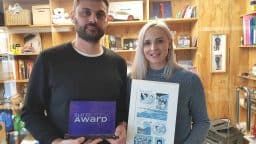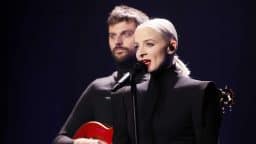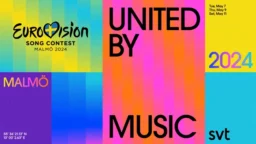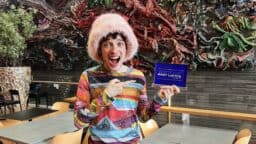They came to Eurovision 2018 with a story. On Twitter, the two members of Madame Monsieur, Émilie Satt and Jean-Karl Lucas, learned about a baby named Mercy, born a refugee, on a boat in the middle of the Mediterranean sea. The sincere lyrics of their song were awarded our ‘Best Lyrics Award’.
One year later, they are back to Eurovision as songwriters for Roi, sung by Bilal Hassani. We had a chat about stories, song lyrics, politics and emotions.
Our Best Lyrics Award rewards the whole text but especially the lines‘I am all these children that the sea has taken, I will live 100 thousand years’. Would you say those are the best lyrics of the song?
Jean-Karl: They are what turns the title « Mercy » into a symbol.
Émilie: Yes, exactly, they do turn Mercy into a symbol. The whole purpose of the song was to transform the word « migrant », which, in people’s minds, is a bit blurry, frightening and unknown, into something human. By personifying migration, in this case through this baby, Mercy, we managed to soften the perception we have of migrants as a whole. So, yes, that sentence you like symbolizes the drama of our time, of these people who flee terror to try and find a better life.
Jean-Karl: We tend to talk about migrants, as Émilie said, as if we were talking about some impersonal crowd , we don’t really know who they are… When we talk about migrants we often talk about statistics, politics, economy, but we never talk about people. So it was important for us to tell a human tale, to see migrants in a human way and not forget that they are regular people with feelings, that they’re human beings like us.
Émilie: When writing that sentence we of course thought a lot about that picture that was shared a lot, I think it was three years ago : the little Aylan, that little boy who was found dead on the beach. Head into the water, with his little sneakers on. It was dreadful. Mercy is also this little boy.
Jean-Karl: We also wanted to tell a positive story, with a happy ending. It was important to talk about this kind of drama in a lighter way, through a story with a positive outcome. It was important because I think children in particular really liked this song. For them it’s like a fairy tale. A lot of parents actually thanked us for writing this song because it had allowed them to start a dialogue about migration with their children.
Émilie: Parents, and teachers as well. To get back to that sentence, we have to consider both sentences as a whole ‘I am all these children that the sea has taken’ and ‘I, Mercy,will live 100 thousand years’. It is way to take revenge. It says: I am going to live 100 000 years for all these children who have no life. It’s this contrast that matters.
Is it hard for you to be part of a sociological discourse? Artists often say that politics is not for them.
Émilie: It’s a question we get a lot. ‘Are you politically committed, are your songs political?’ We’ve always said that our commitment is to people. We’re not law experts. We won’t be able to change the laws. But the strength of a song is to be able to change the way people think, especially children! Children who love Mercy and who understand her story, that is to say: the adults of tomorrow, may be more open-minded than we are today. In this sense you could say that we’re political. But that’s the only way.
Jean-Karl: We’re not here to lecture people. We don’t tell people what to think.
Émilie: We’re telling a story.
Jean-Karl: Underneath all these political questions, lies a very simple fact. People are dying. And they’re human beings.
Émilie: This song is about these children, migrants, but it’s also a lot about Aquarius, SOS Méditerranée and people, citizens who decide to take action and go and save lives. It’s very important, this song is about the people that we save, who are saved but also about the rescuers.
It’s also a little bit about you. You could have told any story but you found this story, through a tweet, I think, and chose to talk about it. It says a lot about your commitment.
Émilie: It all comes from the emotion we felt. So if you take into account the emotion we felt while reading this tweet, then yes, you can understand a bit about who we are, and our sensitivity. But I think that nobody, seeing the picture of that baby, who’s coming into this world…. would stay indifferent to it.
You also chose to pick this song for Eurovision, to broadcast these lyrics to a large audience.
Émilie: It’s true that when we were asked to take part in Eurovision, we were sure we wanted to sing this song, because we thought: it’s a topical issue, a topic that touches Europe and it’s the story of a child, it’s a story about life.
Jean-Karl: We are really proud to have gotten that song to Eurovision and to have been able to sing it in front of 200 million people. With another song, we probably wouldn’t have been able to make it to Eurovision. I think that song touched a lot of people and that’s what matters.
One question about your writing process: did any French-speaking singers-songwriters inspire you?
Émilie: We often talk about Serge Gainsbourg. Because you always find, in his work, essential things like melodic strength and simplicity of lyrics. It doesn’t mean that it’s easy, it means that it goes straight to the point. This kind of songwriting is also timeless. In 50 years’ time, we’ll still be listening to Gainsbourg’s songs. I think there’s a lot of him in our way of writing.
J-K: It’s a mixture between simplicity of lyrics and poetry as well. Of course there’s Serge Gainsbourg who’s an example for us. And then, for Mercy, we thought a lot about French artists like Daniel Balavoine, Michel Berger and France Gall who wrote songs about social issues in a very, very simple way. And, most of all, we wanted it to be a pop song.
Émilie: Not a political anthem.
Jean-Karl: We didn’t want it to be ‘underground’.
Émilie: Nor intellectual.
Jean-Karl: I think we can make pop music and spread true stories at the same time.
Émilie: We’re not only trying to write songs about us but also to put ourselves in others’ shoes. To have empathy. To understand what this other person is feeling, even though we’re far from having the same life. To try and put ourselves in people’s place. That’s why we wrote Mercy using the first person singular, it’s not ‘she was born’, but ‘I was born this morning, my name is Mercy’.
What are your goals for the future?
Émilie: We’d like to write lots of new songs, lots of albums. Make people feel good with our songs, I guess. That’s the point of music, taking care of people.
Jean-Karl: We’d also like to keep meeting people. I am also thinking about what we’ve done before Eurovision and what we’re currently doing and we’d like to show people they shouldn’t be afraid to mingle. We shouldn’t be afraid to be open to others.
Émilie: To be curious.
Jean-Karl: To be curious and always aware, to open our eyes.
Émilie: To take risks.
Jean-Karl: To have no prejudice.
And also to always find new stories, maybe?
Émilie: It’s not that hard to find stories. You just have to look around. Our album is full of life stories just like that one. It’s just a matter of observing beauty wherever it’s hidden. That’s what we’re trying to do, to see a human story and turn it into a song.
Are there lyrics on your album Vu d’icithat you’re especially happy with ?
Jean-Karl: There are several kinds of texts. I, for example, particularly like very poetic texts like Au-delà. And there are also texts that tell a story very simply, like 22 Novembre 2013, the song about the old lovers of the Lutécia hotel who decided to end their lives simultaneously. (To Émilie) What about you?
Émilie: I think this is one of the most nicely written texts, because it’s like a short movie. You can really see the story. And at the same time, it hits close to home because it’s the story of a couple and we are ourselves a couple.
Jean-Karl: It’s very important for us that everybody understands what we’re talking about. But writing simply is not taking the easy way out. These are simple songs but they’re not simplistic. When we’re told our songs are simple, it’s a real compliment.
Émilie: It doesn’t mean we take people for fools. It means we’re going straight to the point. And it is actually harder to find the right word in the right place and at the right time. Thanks to Eurovision, we have fans in all kinds of countries, a lot of them in Ukraine, in Russia and they often write to us saying « I’m learning French with your songs because they’re very clear”. I find it really nice.
The beginning of a song is always special, it pulls us into the story.
Émilie: The first sentences are very important.
Jean-Karl: It took us almost two days to write the lyrics for Mercy, Emily must have written maybe three versions of them and every time I would tell her: ‘I think we can simplify it even more.’ And I would tell her: ‘What do you really wanna tell with this song?’ I think it’s always important to take this as a starting point. The first sentence for example: ‘I was born this morning, my name is Mercy’, may seem basic, it may seem childishly simple, but actually it took us a long time to find this specific sentence. Because you have to get rid of any excess. This very sentence pulls people into the song right away.
You found all these stories – but where did you find the story of Bilal?
Émilie: Well, in Bilal (laughs). It’s true, isn’t it ?
Jean-Karl: Are you talking about the song or do you wanna know where we met Bilal ?
Both, I think.
Émilie: We actually met Bilal not that long ago. Like, 7 months ago ?
Jean-Karl: Yep, really not that long ago !
Émilie: On a film set. It was love at first sight. For him, for his personality. We felt a kind of attraction to him, his craziness, his spontaneity. And at the end of the shooting, which lasted one week, we stayed in touch. I knew he loved singing. And then we invited him over here, to our record label studio, to meet our team. From there it all went really fast. We found ourselves composing this song, which was presented for Eurovision, and one thing led to another… But the actual making of the song started with Bilal and Jean-Karl.The first words that Bilal suggested were ‘I am me’. And then I said : ‘That’s it! We got to get hold of that first sentence and let things happen.’ The goal was not to say ‘I have the right to be who I wanna be and you are the villains.’ There’s no anger. It’s more like:
Jean-Karl: ‘Here’s who I am’.
Émilie: ‘I’ve always been this way and I haven’t decided, all of a sudden, to wear a wig and to become the Bilal that you know today. I’ve always been like this and I’m standing in front of you, in all simplicity.’
These lyrics are so simple and magical. At first, I would hear ‘can’t’ in ‘I can see my kingdom now’: I can’tsee my kingdom now.
Émilie: Oh, like: ‘Right now I can’t see my kingdom, but in my dreams I am a king.’ Yep, it could work too.
Jean-Karl: Not bad (laughs)
You wrote on Facebook that this last Eurovision year was a tornado. What are the top 3 emotions that you felt inside this tornado?
Jean-Karl: The top 3… When we won the TV show in France, it was totally unexpected for us, and that’s when we fully realized that we were going to Eurovision and that our song had touched the French people.
Émilie: They picked us.
Jean-Karl: There’s a lot of pride. We’ve been making music for quite a few years now so it’s a kind of recognition.
Émilie: As for me, I would say it was something reassuring, comforting. Because we’ve come such a long way to become musicians and manage to reach people.
Jean-Karl: After that, I would say, the day of the Eurovision final, when we were on stage and the little light on the camera turned red. We had been preparing for this for months and here it was. There’s something almost reckless to it, as if you were jumping off a plane, without a parachute.
At that very moment, were you rather at ease or nervous?
Jean-Karl: Very comfortable.
Émilie: Yes, very comfortable. Well, before, during the rehearsals, we were very nervous, stressed out, it was almost not fun. Having said that, it makes sense, we had been working so hard that, when the moment came, we found our place and we were totally happy, proud. We were thinking about Mercy, about her mom, we were thinking about the family, about the song, but we were not thinking about how stressed out we were. It’s almost like magic.
What about the third emotion?
Jean-Karl: I would say it’s the day after the final, when all the tension from the previous months really dropped. We had a kind of blues we had never felt before in our lives.
Émilie: It’s more than blues.
Jean-Karl: That day was terrible because we were tired and because we were a bit disappointed with our ranking. We had a kind of ‘Eurovision blues’, which was very hard. We were really carrying a heavy weight on our shoulders.
Émilie: What a strong contrast between the day before and the day after, when we woke up…
Jean-Karl: And it’s actually over, Eurovision is over.
Émilie: It’s very difficult to describe. It was a deep sadness inside. We loosened up, we were sad, we were crying.
Jean-Karl: We were tired.
Émilie: It’s a horrible feeling, really (laughs). Thank God we were with each other (laughs).
What about Mercy ?
Émilie: Yes…There was a great fourth moment of emotion. The story says that Mercy was born on a boat and then landed in Italy. We didn’t know where. We didn’t even know if she was alive. But journalists investigated and managed to find her, after a couple of months. We started getting in touch with her a few weeks before Eurovision. But the first time we talked, through FaceTime, was the afternoon…
Jean-Karl: …before the final!
Émilie: The day of the Eurovision final! So we were in our room. We were tired, stressed out about the big night and everything and then we had a first call through FaceTime. The very day of Eurovision. It was magical. It gave us strength, it made us want to go for it all the more, to sing well, play well, and anyway, it was just great.
Jean-Karl: And when we got back from the show room, after Eurovision, we got back to the hotel, where we were shown a video of little Mercy and her mom, watching the final live, in Italy.
Émilie: In the refugee camp !
Jean-Karl: That moment made us realize what the real Eurovision victory was all about. That’s when we knew we had been right to do it and that this was our reward. Not the Eurovision trophy but this very video.
Émilie: And we know that today, Mercy and her mom, Taiwo,are safe and sound. Their documents are in order. They now live in Naples. Taiwo’s working and Mercy has just celebrated her second birthday. We talk all the time, we visited them…. Oh, it’s so great.





